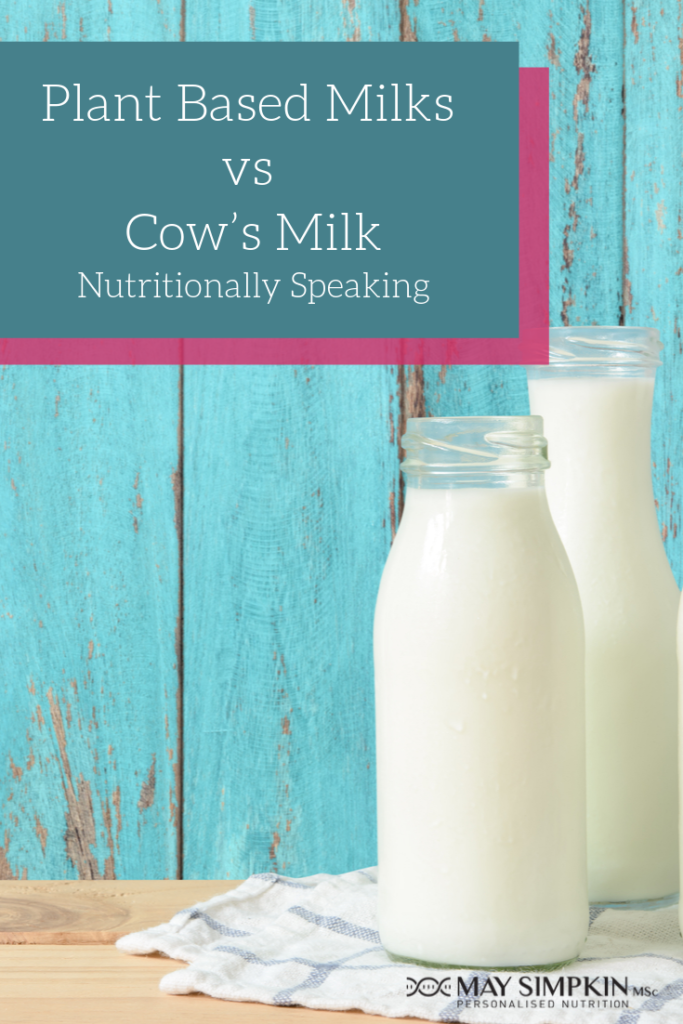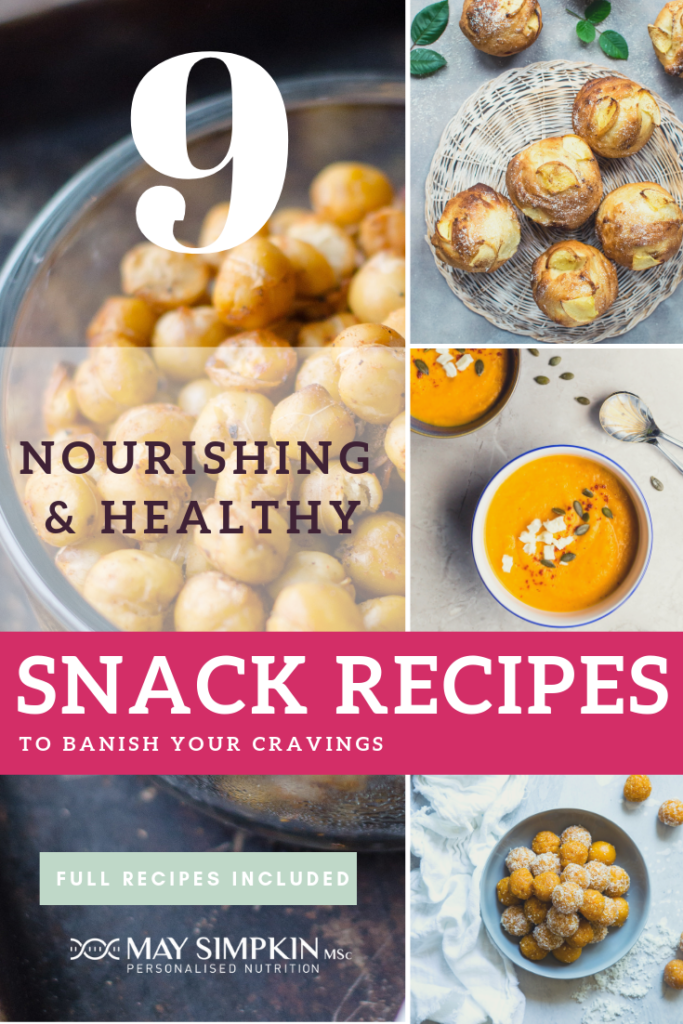
With the rise of plant-based milk in our supermarkets, seems cow’s milk is less popular than ever these days; consumption rates have dropped significantly in the last 20 years. There are many reasons for this including links with skin health, taste, allergies, lactose intolerance, ethics and the rise in popularity of alternatives.
Making plant-based milk is similar to the juicing process. They are usually made by grinding the base source for example; soybeans, nuts, rice, oats, hemp seed etc and combining with filtered water. The taste, texture and consistency can then be altered with various additives, whilst the nutritive value can be fortified with nutrients.
I’m often asked which milk is best and nutritionally speaking, there are certainly differences between them.
Dairy is often hailed as being crucial to a healthy balanced diet and plant-based milk as alternatives struggle to compete with traditional cow’s milk, mainly due to the difference in protein as well as other nutrients.
Let’s look at why cow’s milk has been so popular until now….
- It is a good source of bio-available calcium that is essential for bone health. In other words, the calcium is in a form that is recognised by the body and easily absorbed. Cutting out cow’s milk in adolescence through to adulthood can significantly reduce the intake of calcium resulting in brittle bones over time
- It is a first-class source of protein, essential for muscle repair as well as the production of enzymes, neurotransmitters and hormones
- It is rich in nutrients rich in phosphorus, potassium, iodine and vitamin B12
- In the UK, one of the main sources of iodine comes from cow’s milk and dairy products. We need iodine to make Thyroid hormones and without it, thyroid health is compromised.
Plant based milks do not offer anywhere near the level of nutrients available in cow’s milk and will need to be fortified by manufacturers to ensure adequate nutrients as a good alternative to milk.
So which of the plant-based milk are the best cow’s milk alternative?
Unsweetenedplant-based milk |
In Comparison with 240ml serving of Cow’s milk |
Soya Milk |
|
Hemp Milk |
|
Oat Milk |
|
Almond Milk |
|
Coconut Milk |
|
Rice Milk |
|
The Bottom Line
Choose milk that you enjoy and like the taste of, that has been fortified to ensure adequate calcium – as close to 140g per 100ml as possible and other nutrients as far as possible.
However, there’s one I never recommend for regular consumption….Soy Milk
We’re led to believe that this milk is safe and nutritious and a healthy alternative to switch to on a regular basis. Unfortunately, this is not true.
Good quality soy milk is made simply from soybeans and water, which certainly sounds natural but many soy milks is made with chemical compounds called isoflavones, which is a phytoestrogen, the plant form of the hormone oestrogen. This mimics the body’s natural oestrogen and overconsumption of soy milk can lead to hormone imbalance and therefore associated symptoms. Ironically, many switches to soy milk in an attempt to balance hormones in the first place.
If you’re choosing soy milk to meet your daily protein needs, it is essential that you look at the ingredients list and avoid one that contains “soy isolate”. This is a highly processed derivative of soy and can lead to imbalances in the body. READ MORE
There’s another two I’m also not keen on for regular consumption…
Oat Milk
Oat milk is a high-carb milk alternative and unless you’re keeping an eye on your carb intake as a whole, you can easily find that overconsumption of oat milk will lead to too many carbs in your diet. Again, if you’re making oat milk from scratch, it’s just oats and water but many brands are loaded with sugar, additives, thickeners etc which mean this highly processed version is not as healthy as you may think.
In addition, If you’re sensitive to gluten, you may find yourself inadvertently subjected to gluten cross-contamination, which can lead to inflammation and cause a number of health issues, including leaky gut.
Rice Milk
Most rice milk brands are low in nutrients, but are fortified and loaded with additives. Just like oats, they are high in carbs and a high GI food, which means it will be processed quickly and therefore cause blood sugar imbalances, making it harder to manage weight. But there’s another thing with rice milk…it may contain arsenic.
Whilst arsenic is a substance that is naturally present in the environment it can easily end up in our food and water in varying amounts; it’s impossible to eliminate but relying on rice and it’s food derivatives can lead to having too much arsenic, which can be harmful to our health.
Due to their high consumption and low body weight, the UK Food Standards Agency does not recommend rice milk as an alternative for children under 5 years.
The problem with making your own…
Making your own plant-based milks is fine as a one off, but if you’ve given up dairy and replacing it with plant-based alternatives, the homemade version will not be fortified with calcium, vitamins D and B. Although it is certainly cheaper and there is freedom to use a much higher percentage of the base ingredient, the lack of fortification is very important to bear in mind.
Consider your life-stage…
Choosing the right milk to suit your needs is crucial. For example, the key development years; for example; toddlers, teens and pregnancy will have high protein, vitamin D and calcium requirements – all abundant in cow’s milk. Those watching calories can consider other lower calories options, whilst those approaching or in menopause will need to avoid disruption of hormone balance.
Getting adequate calcium is often the worry when it comes to going dairy-free and therefore opting for a fortified plant-based version will ensure good levels and reduce the risk of developing osteoporosis in later life.
NOTE: This blog posts accompanies a Facebook Live video – Find it here
Nutritional Nugget
Organic vs Non-Organic Cow’s Milk?
Organic cow’s milk is produced with better animal welfare in mind and without the use of pesticides. The nutritional profile of organic milk will depend upon the feed the cows are offered and generally considered superior, with some studies suggesting organic milk contained 50% more omega-3 fatty acids and higher concentrations of iron, vitamin E and other nutrients. Organic whole milk often contains 4 per cent fat or more, a higher level than standardised whole milk. However, studies have also suggested that organic milk had lower levels of iodine, needed by the body to produce the thyroid hormones and selenium, a powerful antioxidant that protects against cell damage. For the full report, CLICK HERE
You may like to watch this Facebook Live session where I covered the topic to accompany this post
[gosyoutube gos_attr_src=”https://youtu.be/qSgk93eixCQ” gos_attr_width=””][/gosyoutube]
If you’re considering which milk is best with your morning coffee, the good news is that recent studies have shown that up to 3-4 cups per day are deemed safe to consume! READ MORE
So, will you be making a different choice? What is your favourite plant-based milk? Do let me know in the comments below.










11 Comments
Jolanta Waugh
Great article!
What do you think about about LactoFree Milk?
My son, age 5 is lactose intolerant, very gassy and the gas is very "potent".
As I am worried about him not getting enough calcium and nutrients. Also I don't feel comfortable with too much soya because of the influence on his hormonal balance.
What would you advice?
May Simpkin
If your son is allergic to Lactose, then he will need to consider a lactose free milk. If he isn't, it is important to get to the bottom of why he is getting symptoms. You would need to look at his full diet and any other contributing factors. I suggest a full consultation with my Health Improvement Programme as it does need to be personalised.
Jenny Reid
This is such a helpful article, thank you so much for clarifying the differences so easily. Your weekly emails are so clear and thorough and i really value your advice.
I have just watched a Countryfile and. I have been reminded of how pure cow's milk is. Having read about the artificial ways that other "milks" are made, it makes me think i should go back to it. i switched to almond milk in porridge and on my cereals as I had understood that it was better than cow's milk, although I don't have an intolerance. I do worry about the calcium levels though (and osteoporosis risk). I am 42.
My 2 questions are:
1. if i don't have a dairy intolerance, should I switch back to (organic) dairy?
2. is it true that skimmed milk has the same calcium levels as full fat? if so, is this the best option to keep calories down, or are there benefits of full fat?
Thank you so much!
May Simpkin
Hi Jenny - thank you so much for your kind comments and I am so pleased you find my work helpful. With regards to your questions, I do feel that there is a place for cow's milk, if we are to consider the nutritional benefits specifically. As I mention in the video, unless you have an allergy, then there is no reason to avoid it. It has the highest amount of protein when compared to the other milk alternatives, which not only fulfils your body's protein needs (not only hair, skin & nails but also making, more crucially enzymes, hormones & neurotransmitters), but also keeps you fuller for longer. Skimmed milk does have a similar calcium content but there is no reason to avoid the fat, which also has plenty of health benefits, including providing fat soluble vitamins A, D, E & K. Even full fat milk is only 4% fat, which is hardly anything! I personally choose semi-skimmed simply because I prefer the taste! Hope this helps?
Jenny Reid
Thank you May, it really does!
I've just seen your video on cooking with fats, again so helpful.
Carolyn
Thank you for this article promoting the nutritional benefits of cows milk. My only concern is with the oestrogen content of cows milk, because I was diagnosed with the type of breast cancer that thrives on this hormone last year.
May Simpkin
It is important to make a choice that is right for your needs and as you can see, there are many alternatives, that are also nutritious, for you to consider as part of a balanced and varied diet.
Rachel
This helps to confirm to me that I can happily stay on standard milk. Thank you.
May Simpkin
Good to hear - it's a great choice
Sophie Hill
Very interesting read! Definitely worth considering! Thanks for sharing!
Jessica Moore
This was great! Can't wait for your upcoming content! What have you got planned for us?very nice… i really like your blog…